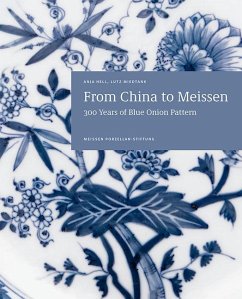Eine Leseprobe finden Sie unter "https://verlag.sandstein.de/reader/98-722-Zwiebelmuster-engl"The Blue Onion Pattern is almost as old as the European invention of porcelain itself! But what is so special about it? Why has it fascinated us for three hundred years? What role did the Onion Pattern play in 18th century Chinese export porcelain in underglaze blue and famille rose? The history of the Blue Onion Pattern is intertwined with the history of blue-and-white porcelain painting itself. Anja Hell sheds light on the beginnings of Meissen underglaze blue painting until the year 1739, and later covers the range from the 19th century to the present. She examines the artistic development of blue-and-white painting and the associated economic implications for the Meissen Manufactory.Lutz Miedtank cogently presents the results of his many years of research on the early period of the Blue Onion Pattern. Inspired by Chinese export porcelain and underglaze blue decorated faience, Meissen's blue painters created their own Meissen Blue Onion Pattern on hard paste porcelain around 1730. Hitherto unpublished Chinese export and early Meissen porcelain with "Blue Onion" designs including several over-decorations that were re-dated using XRF data, as well as numerous imitations of the pattern on 18th century European porcelain and faience are shown. They provide important evidence for new and surprising insights into the genesis of the Meissen Blue Onion Pattern.This English edition is based on the revised 2023 German edition of Von China nach Meissen. 300 Jahre Zwiebelmuster published in open access. It features an Introduction by Prof. Dr. Ulrich Pietsch, Director emeritus of the Dresden Porcelain Collection. A large number of previously unpublished porcelain objects, copious comments and annotations, and a comprehensive list of primary sources render this book an indispensable reference work for collectors, art dealers, historians, and friends of the Blue Onion Pattern.
Bitte wählen Sie Ihr Anliegen aus.
Rechnungen
Retourenschein anfordern
Bestellstatus
Storno









